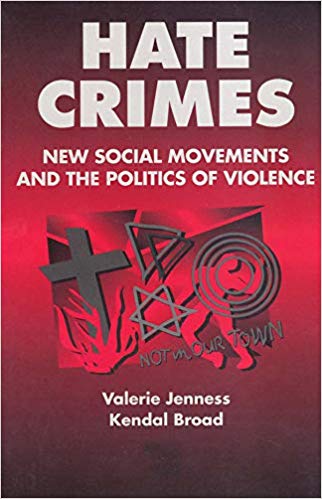Violence directed at victimized groups because of their real or imagined characteristics is as old as humankind. Why, then, have "hate crimes" only recently become recognized as a serious social problem, especially in the United States? This book addresses a timely set of questions about the politics and dynamics of intergroup violence manifested as discrimination. It explores such issues as why injuries against some groups of people—Jews, people of color, gays and lesbians, and, on occasion, women and those with disabilities—have increasingly captured notice, while similar acts of bias-motivated violence continue to go unnoticed.
The authors offer empirically grounded, theoretically informed answers to the question: How is social change on this order possible? Their analysis of the dynamics draws upon three established traditions: the social constructionist approach; new social movements theory; and the new institutionalist approach to understanding change as a process of innovation and diffusion of cultural forms. In this case, new social movements have converged of late to sustain public discussions that put into question issues of "rights" and "harm" as they relate to a variety of minority constituencies.
The authors couple their general discussion with close attention to many particular anti-violence projects. They thereby develop a compelling theoretical argument about the social processes through which new social problems emerge, social policy is developed and diffused, and new cultural forms are institutionalized.
چکیده فارسی
خشونت اعمال شده علیه گروه های قربانی به دلیل ویژگی های واقعی یا خیالی شان به قدمت نوع بشر است. پس چرا "جرایم ناشی از نفرت" به تازگی به عنوان یک مشکل اجتماعی جدی به ویژه در ایالات متحده شناخته شده است؟ این کتاب به مجموعه ای از سوالات به موقع در مورد سیاست و پویایی خشونت بین گروهی که به عنوان تبعیض آشکار می شود، می پردازد. این موضوع به بررسی این موضوع میپردازد که چرا جراحات علیه برخی از گروههای مردم - یهودیان، رنگینپوستان، همجنسبازان و لزبینها، و گاهی اوقات، زنان و افراد دارای معلولیت - به طور فزایندهای مورد توجه قرار گرفته است، در حالی که اعمال مشابه خشونتهای با انگیزه سوگیری همچنان ادامه دارد. بدون توجه.
نویسندگان پاسخهای مبتنی بر تجربی و نظری به این سؤال ارائه میکنند: تغییر اجتماعی بر اساس این ترتیب چگونه ممکن است؟ تحلیل آنها از پویایی بر سه سنت تثبیت شده استوار است: رویکرد ساختگرای اجتماعی. نظریه جنبش های اجتماعی جدید; و رویکرد نهادگرایانه جدید برای درک تغییر به عنوان فرآیندی از نوآوری و انتشار اشکال فرهنگی. در این مورد، جنبشهای اجتماعی جدید اخیراً برای حفظ بحثهای عمومی که مسائل مربوط به «حقوق» و «آسیب» را زیر سؤال میبرد، به هم پیوستهاند.
نویسندگان بحث کلی خود را با توجه دقیق به بسیاری از پروژه های خاص ضد خشونت ترکیب می کنند. آنها از این طریق یک استدلال نظری قانعکننده در مورد فرآیندهای اجتماعی ایجاد میکنند که از طریق آن مشکلات اجتماعی جدید پدید میآیند، سیاستهای اجتماعی توسعه مییابند و منتشر میشوند، و اشکال فرهنگی جدید نهادینه میشوند.
ادامه ...
بستن ...
Ebook details:
عنوان: Hate Crimes: New Social Movements and the Politics of Violence (Social Problems and Social Issues)
نویسنده: Kendal Broad, Valerie Jenness
ناشر: Aldine Transaction; 1 edition (December 31, 1997)
زبان: English
شابک: 020230602X, 978-0202306025
حجم: 17 Mb
فرمت: True Pdf
ادامه ...
بستن ...










